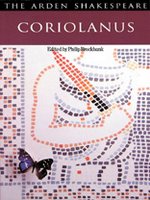
Coriolanus, by William Shakespeare
Having the good fortune of being in two reading groups affords me a chance to read for pleasure and see some friends, time for which is considerably scarce of late. One of these reading groups is with a handful of Argo alums, and we try to gather once a year, usually around the winter break, to read and discuss one "obscure" Shakespeare play. In the past we read King John and Cymbelline (although last year we broke from the Shakespeare tradition and read the entire Divina Commedia). This time around, we chose The Tragedy of Coriolanus.
I enjoyed this play and find it somewhat disappointing that it isn't as "popular" as many of Shakespeare's other tragedies. While it lacks the cosmic depth of Lear and Hamlet, or even the range of emotion found in Macbeth and Othello, Coriolanus seems to me a perfect companion piece to any study of Julius Caesar, with its ancient Roman storyline and its obvious political commentary. The citizenry of Rome is explored more in depth in this play, yet both plays examine the give-and-take between the rulers and the ruled in interesting ways. Before we meet as a group, I'd like to go back and re-read a few passages more closely to figure out what Shakespeare might be "saying" about politics, the ruling class vs. commoners, human behavior (often described in cannibalistic or animalistic images), etc.
Typically with me, whenever I read a Shakespeare play for the first time I tend to notice his use of imagery most of all (thanks, Prof. Boyer! : ) ). It seems like everything Will wrote makes use of images relating to disease/infection, blood, body parts, animals, and food/eating. However, there's a cool butterfly reference that flutters through various parts of the play, culminating in Act V, sc. iv, lines 11-14, which corresponds to the changing nature of the title character. Also, I picked up on a TON of repetitions, and I wonder how that particular stylistic device relates to Coriolanus and the play as a whole. Again, I need to go back and consider some of these before the group meets.
Coriolanus is definitely one of the better Shakespeare plays I've read!
No comments:
Post a Comment